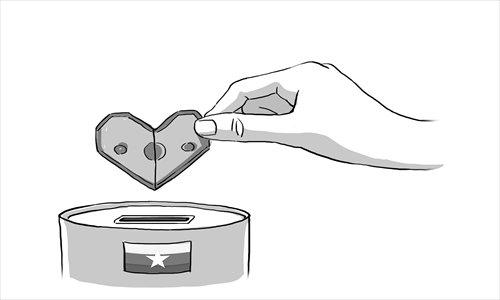Charity can make China’s place in the world

I recently went to Myanmar with representatives from the Global Times Foundation to do some field research there. We visited some local NGOs and charity organizations. There are quite a lot of foreign charities in Myanmar, but most of them come from Western countries or Japan.
In recent years, China has been the largest investor in Myanmar. Chinese enterprises in Myanmar have attached more importance to social responsibility by setting up schools and hospitals. Some even established special organizations to fulfill corporate social responsibilities.
However, the public interest projects initiated by China's charities or NGOs can hardly be seen in Myanmar. It's the same as in other China's neighboring countries. Despite a large amount of assistance from the Chinese government, private charity has played a very limited role.
The Myanmar army has clashed with the Kachin Independence Army in the northern part of the country, which borders China, resulting in many people being left homeless.
Some charity organizations from the West, especially Christian and Catholic ones, have come to the region and offered assistance. Charities from Japan, both official and nongovernmental, have also helped. However, not many Chinese organizations were involved.
In China's neighboring countries, the influence of Japan has been much greater than that of China. One important reason is that Japan's civil charities have been playing an active role.
Yohei Sasakawa, who has been named as the Japanese government's representative to help bring peace among Myanmar's ethnic minorities, is chairman of the Nippon Foundation and seen as a pioneer in guiding public-interest activities in modern Japan.
Charity is a social activity to send goodwill without any payoff. They are not considered as a means to interfere in other countries' politics. The active role of Chinese charitable organizations will display the Chinese public's great breadth of mind.
The world has come to the stage where it can embrace shared interests. China cannot simply think of its own interests. Without the understanding and support of the Myanmese public, China's interests cannot be well maintained.
In my field research this time, Martin Pun, chairman of the Myanmar Business Coalition on AIDS, told me that in recent years, Myanmese carriers of HIV, malaria and dengue fever can constantly be found at the ports in China's Guangdong and Yunnan provinces.
Pun said that China's medical researchers have already realized that if they cannot help Myanmar prevent these diseases from spreading, China won't be able to isolate itself from the problem. It clearly shows how intimately the Chinese public and Myanmese people are linked.
Many Chinese prefer to calculate the exact benefits international charity work will bring to them. This has been the long-standing sentiment among the Chinese public. It is partly because previous assistance to foreign countries has had an official background and used taxpayers' money. If the organizations were privately owned, they would probably win more understanding.
If China's civil charities are to play a role overseas, we need to change domestic opinion toward international charity work. Microsoft mogul Bill Gates can help China with its AIDS problems, why cannot China help Myanmese people living in poverty?
If a country's citizens are always too calculating about their own interests and payoffs, the country cannot take a place in the world stage, nor can it maintain its national interests.
China is not a rich country yet, but it's a country of compassion. Caring about the lives of people in other countries should be the core of Chinese values.
The author is a senior editor with People's Daily. He's now stationed in Bangkok. dinggang@globaltimes.com.cn